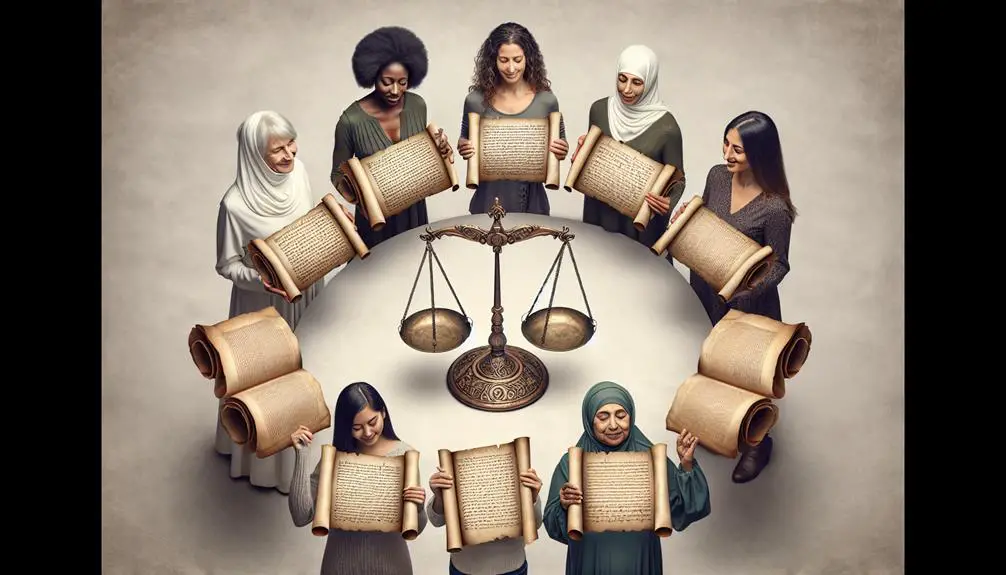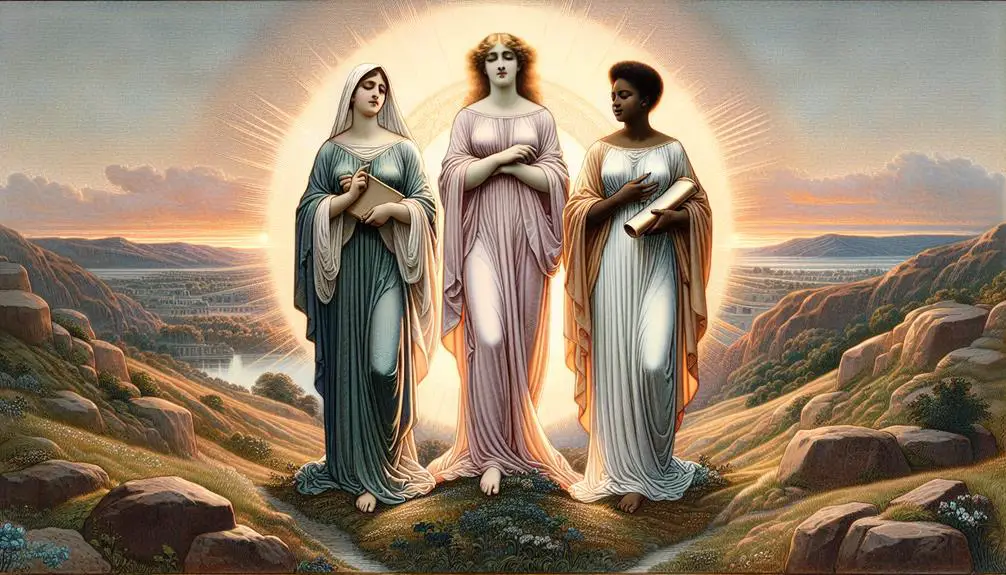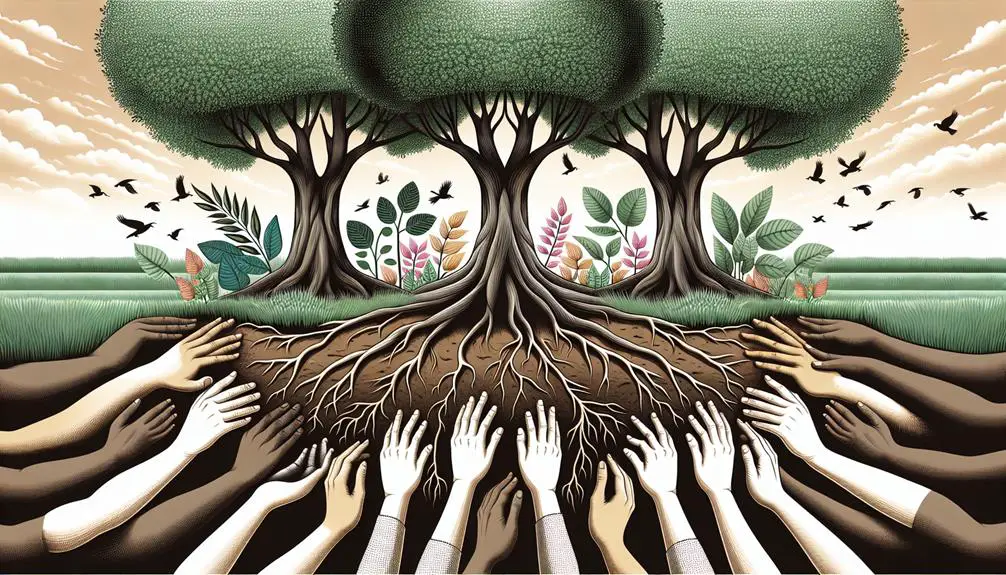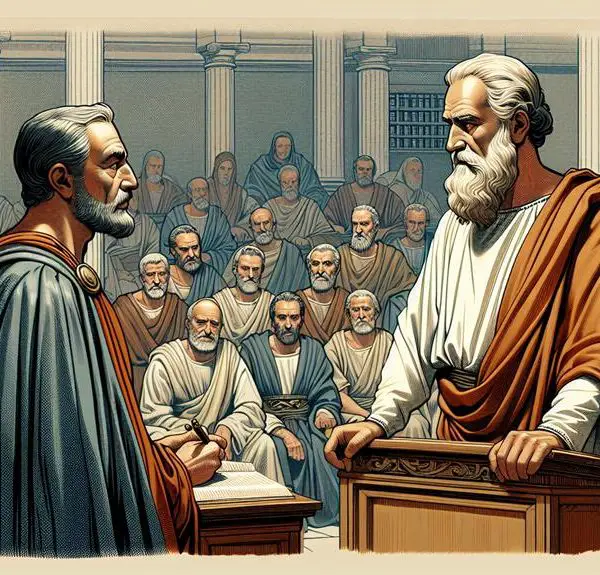Peeling back layers of historical interpretation, 'Feminism in the Bible Quotes' reveals surprising truths about women's roles and power—discover more inside.

Feminism in the Bible Quotes
Exploring feminism in Bible quotes is like unraveling a tapestry, each thread revealing patterns of wisdom, strength, and liberation that have been woven through ancient texts.
You'll discover how women of the Bible, often seen through a patriarchal lens, emerge as leaders, prophets, and partners in the divine narrative. This journey challenges traditional interpretations and invites you to see these stories in a new light, where female voices echo with authority and grace.
As you explore, you'll find that these ancient texts hold contemporary relevance, offering insights into equality, respect, and partnership that are as pressing today as they were millennia ago.
Why does this matter? Let's explore together.
Key Takeaways
- Biblical texts contain examples of women in leadership and prophetic roles, challenging traditional gender norms.
- Feminism within the Bible emphasizes the strength, intelligence, and spiritual depth of women.
- Female figures like Deborah and the Proverbs 31 woman exemplify wisdom, courage, and industriousness.
- Understanding the historical and cultural context of the Bible reveals a nuanced perspective on gender equality and women's empowerment.
Unveiling Biblical Equality

Exploring biblical texts reveals a nuanced landscape of gender equality, challenging traditional interpretations and inviting a reevaluation of perceived norms. The scriptures, when examined critically, offer insights that defy patriarchal interpretations, suggesting a more egalitarian perspective on gender roles. It's crucial to consider the cultural context in which these texts were written, as it greatly influences our understanding of them today. The historical backdrop of the Bible was undeniably patriarchal, yet within its pages, there are instances that suggest a recognition of women's worth and contributions that transcend mere reproductive or domestic roles.
This assessment prompts a rethinking of how biblical narratives have been framed, pushing against a purely patriarchal reading. By delving into the cultural context, you uncover layers of meaning that patriarchal interpretations might've overlooked or intentionally ignored. It's an invitation to scrutinize not just the text but the lens through which we view it, acknowledging the influence of contemporary biases on our understanding of ancient scriptures. This analytical approach doesn't just challenge existing norms; it enriches our comprehension of the Bible, offering a more inclusive and balanced interpretation of its teachings on gender equality.
Women of Wisdom

Throughout the Bible, women of wisdom emerge as pivotal figures, embodying knowledge and insight often overlooked in traditional interpretations. These women not only contribute to the foundational ethos of biblical narratives but also model virtues of leadership, resilience, and moral integrity. Their stories and proverbs offer rich lessons in maternal guidance and virtuous living, providing a nuanced understanding of the role of women in ancient texts.
- Maternal guidance: The Bible frequently highlights the role of women as educators and moral guides within the family structure. This form of wisdom, often passed down through generations, emphasizes the importance of nurturing and guidance in shaping virtuous individuals.
- Virtuous living: Passages related to women of wisdom underscore the virtues of kindness, diligence, and fear of the Lord. These traits aren't only esteemed but are depicted as foundational to a well-lived life.
- Role models: Women like the Proverbs 31 woman serve as exemplars of industriousness and virtue, offering a template for both men and women to aspire to.
- Intellectual and spiritual insight: Beyond domestic realms, women in the Bible exhibit profound intellectual and spiritual depth, engaging in complex theological discussions and moral reasoning.
In analyzing these narratives, we uncover a tradition that values and elevates the contributions of women, challenging modern readers to rethink conventional interpretations.
Prophetic Female Voices

Within the biblical narrative, female prophets stand as powerful agents of divine will, their voices resonating with authority and insight. Miriam's Songs and Deborah's Rule exemplify this profound presence of prophetic female voices.
Miriam, the sister of Moses, is celebrated for her role in the Exodus, her song of triumph at the Red Sea serving as a testament to her spiritual leadership and prophetic gifts. Her music not only commemorates a pivotal moment in Israelite history but also underscores the significance of women's contributions to communal faith and identity.
Deborah's Rule further illustrates the capacity of women to assume roles of spiritual and political leadership. As a prophetess and judge, Deborah's story is unique in the biblical text, highlighting her wisdom, courage, and divine guidance. Her leadership during a period of oppression showcases the direct involvement of women in the deliverance and governance of their people, challenging traditional gender roles.
These examples shed light on the complex roles of women in biblical narratives. They don't just support the main characters or serve peripheral roles; instead, they're central figures in their own right, showcasing strength, leadership, and a direct connection to the divine.
Leadership and Liberation

You'll find that the Bible redefines women's roles in contexts of leadership and liberation, challenging traditional narratives.
Through biblical liberation narratives, it's evident that women's contributions were pivotal in both spiritual and societal shifts.
This reevaluation prompts a deeper understanding of feminism within a biblical framework, emphasizing the significance of female leadership.
Women's Roles Redefined
How does the Bible, a text rooted in ancient traditions, redefine women's roles in terms of leadership and liberation? Despite patriarchal interpretations and modern controversies, a closer analysis reveals instances where women's roles are significantly redefined. This shift provides a nuanced understanding of their potential for leadership and liberation within a biblical context.
- Contextual Reinterpretation: Understanding verses within their historical and cultural context challenges traditional patriarchal views.
- Prominent Female Figures: Biblical narratives include women in leadership roles, subtly advocating for gender equality.
- Theological Debates: Scholarly discussions continue to explore the extent of women's liberation in biblical texts.
- Gender Dynamics: Analysis reveals evolving perspectives on gender roles, contributing to modern feminist interpretations.
These elements collectively contribute to a redefined perspective on women's capabilities and rights in religious and societal structures.
Biblical Liberation Narratives
Building on the redefined roles of women in biblical contexts, let's explore the narratives that exemplify their leadership and liberation, highlighting how these stories contribute to a deeper understanding of biblical feminism.
Women in Leadership |
Liberation Narratives |
|---|---|
Deborah's Judgeship |
Deborah leads Israel to victory, challenging patriarchal contexts. |
Esther's Courage |
Esther risks her life, influencing the king, and saving her people. |
Mary Magdalene |
First to witness and proclaim Jesus' resurrection, defying societal norms. |
Ruth's Loyalty |
Ruth's story emphasizes loyalty and the breaking of ethnic barriers. |
Phoebe the Deacon |
Phoebe's role in the early church highlights female leadership roles. |
These accounts, read through modern interpretations, challenge traditional views and inspire a reevaluation of women's roles in religious and societal contexts.
Celebrating Female Strength

You'll find that the Bible doesn't shy away from portraying women as figures of considerable strength and wisdom. It highlights empowering biblical women who not only navigate their circumstances with grace but also receive divine support in their endeavors.
Additionally, the portrayal of wisdom with a feminine voice underscores the text's acknowledgment of female strength and insight.
Empowering Biblical Women
Empowering biblical women showcases the inherent strength and resilience found in various narratives throughout the Bible, reflecting a nuanced celebration of female fortitude.
- Marital dynamics: The Bible presents complex marital relationships that often highlight the agency and wisdom of women within their cultural contexts, challenging traditional perceptions.
- Cultural contexts: By examining the roles of women through the lens of their historical and cultural backgrounds, one gains a deeper understanding of their empowerment against societal norms.
- Leadership roles: Several biblical women assume leadership positions, guiding their people with strength and intelligence.
- Spiritual insight: Many narratives underscore women's unique spiritual insights and contributions to their communities, emphasizing their integral role in the fabric of biblical history.
Heroines' Divine Support
Throughout biblical narratives, divine support for heroines underscores their significant roles in demonstrating resilience and strength, despite the challenges posed by their cultural and societal contexts. Miraculous interventions and spiritual guidance often underscore the pivotal moments in these stories, reinforcing the idea that divine forces not only recognize but also empower female strength and wisdom.
Heroine |
Type of Divine Support |
|---|---|
Esther |
Spiritual guidance |
Deborah |
Miraculous intervention |
Mary |
Spiritual guidance |
This table highlights examples where heroines received divine backing, emphasizing that their contributions were not solely of their own making but also a result of divine favor. Such narratives serve to illustrate the integral role of spiritual support in enabling these women to fulfill their destinies, thereby celebrating female strength within a divine context.
Wisdom's Feminine Voice
In the biblical tradition, Wisdom is often personified as a woman, offering a unique lens through which to view the celebration of female strength and intellect. This personification isn't merely decorative; it's deeply rooted in the cultural context of the times, serving as a powerful tool for examining gender dynamics within the scriptures.
By employing gendered metaphors, these texts invite you to reconsider traditional narratives about wisdom and strength, positioning them within a feminized framework.
- Gendered metaphors highlight the intertwining of wisdom with feminine qualities.
- Cultural context enriches understanding of these portrayals, suggesting a nuanced view of gender.
- The personification of Wisdom as a woman challenges conventional gender roles.
- This perspective encourages a reevaluation of femininity and intellect's value within a biblical framework.
Partnership and Respect

The concept of partnership and respect between genders is subtly woven into various narratives and teachings within the Bible, challenging traditional interpretations of gender roles. This dynamic is particularly evident in the context of marital dynamics, where the Bible advocates for a partnership that transcends the conventional confines of gender roles.
In the realm of partnership and respect, it's crucial to recognize that the Bible presents a framework where individuals are seen as equal partners, contributing uniquely to the relationship. This perspective encourages a mutual respect and understanding that is vital for a healthy partnership.
Aspect |
Explanation |
|---|---|
Marital Dynamics |
Emphasizes equality and mutual support, challenging traditional, hierarchical gender roles. |
Decision Making |
Advocates for joint decisions, highlighting the importance of respect and consensus in a partnership. |
Spiritual Leadership |
Illustrates that leadership within a relationship should be based on spiritual qualities, not gender. |
Analyzing these elements, it's evident that the Bible's portrayal of partnership and respect offers a counter-narrative to patriarchal interpretations, advocating for an egalitarian approach to relationships. This biblical perspective encourages individuals to view and treat each other as equals, fostering a more inclusive and respectful societal framework.
Frequently Asked Questions
How Have Traditional Interpretations of the Bible Contributed to the Marginalization of Women in Religious Communities, and What Are Contemporary Scholars Doing to Challenge These Interpretations?
Traditional interpretations of the Bible have often reinforced ecclesiastical patriarchy, contributing to the marginalization of women in religious communities. These interpretations have prioritized male-centric narratives, sidelining women's roles and contributions.
Contemporary scholars are challenging these views by promoting gender empowerment and reevaluating texts to highlight women's agency and leadership. They're deciphering historical contexts and advocating for more inclusive understandings, aiming to dismantle longstanding biases and foster equality within religious discourse.
In What Ways Do Cultural and Historical Contexts Impact the Understanding and Application of Biblical Texts Regarding Women's Roles, and How Can Modern Readers Account for These Contexts When Interpreting These Texts?
You're diving into an ocean of interpretations when you explore how cultural and historical contexts shape our understanding of women's roles in biblical texts. Historical accuracy and literary genres are your compass and map in this exploration.
Are There Any Specific Biblical Passages That Have Been Historically Used to Justify the Subjugation of Women, and How Are Feminist Theologians Reinterpreting These Passages Today?
You're examining how certain biblical passages, historically used to justify women's subjugation, are being reinterpreted. Texts mentioning women's silence in church or Eve's curse are pivotal examples.
Historically, these were seen as mandates for female subordination. Today, feminist theologians analyze them with a critical lens, challenging traditional interpretations and advocating for a more egalitarian understanding.
They argue these passages must be viewed within their cultural and historical contexts to grasp their true implications.
How Do Feminist Interpretations of the Bible Align or Conflict With the Doctrines of Major Christian Denominations, and What Has Been the Response From These Religious Communities?
You're navigating a tightrope when comparing feminist interpretations with traditional Christian doctrines. These modern readings can clash with established views, particularly on church leadership roles.
Some denominations have embraced these discussions, leading to ecumenical dialogues and even shifts in gender roles within church leadership. Yet, others remain steadfast, viewing these interpretations as conflicting with core teachings.
The response varies widely, reflecting the diverse tapestry of belief within the Christian community.
Can Feminist Hermeneutics of the Bible Offer Insights or Guidance on Addressing Contemporary Gender Issues, Such as Gender-Based Violence, Reproductive Rights, and Gender Equality in Leadership Positions Within and Outside Religious Institutions?
Yes, feminist hermeneutics can provide valuable insights on contemporary gender issues. By reinterpreting biblical texts through a lens of gender empowerment, you'll find guidance on tackling gender-based violence, advocating for reproductive rights, and promoting gender equality in leadership.
Feminist exegesis challenges traditional interpretations, encouraging a more inclusive understanding that aligns with modern principles of equality. It's a tool that can reshape perceptions within and outside religious communities.
Conclusion
As your journey through the tapestry of Biblical narratives concludes, you've traversed valleys of wisdom and climbed mountains of strength alongside its women. These scriptures, more than ancient texts, echo the timeless call for equality and respect between genders.
In the heart of Biblical stories, female voices emerge not as whispers but as thunder, shaping history and divine discourse alike.
This exploration reveals that the Bible, often viewed through a patriarchal lens, holds a profound, egalitarian essence, inviting a reevaluation of its teachings on gender dynamics.



Sign up